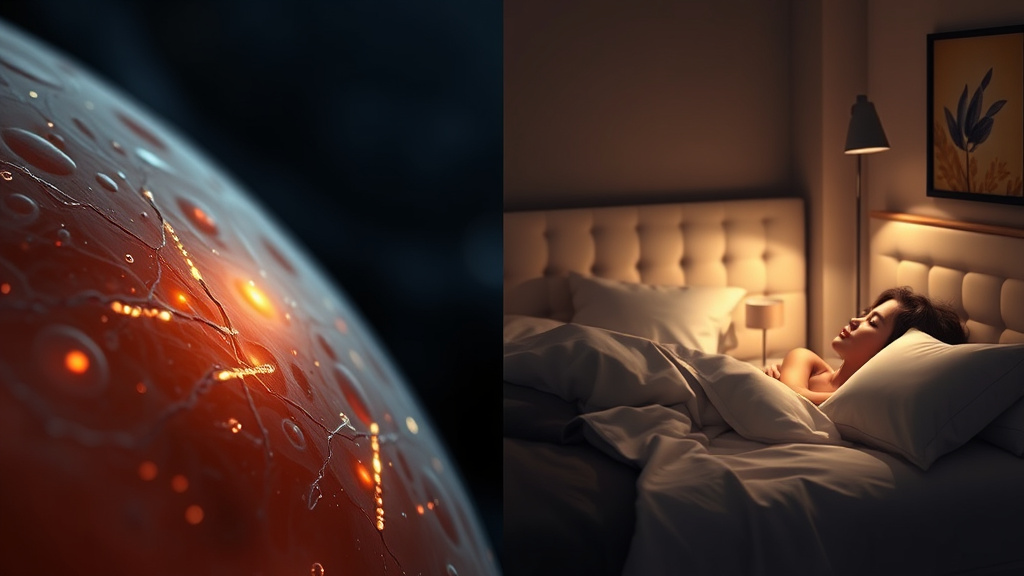Understanding how sleep affects your skin is key to unlocking a more radiant, healthy complexion. Sleep isn’t just a time for rest—it’s a vital process that influences cellular repair, hormonal balance, and even the efficiency of your skin’s barrier function. Poor sleep can instantly show on your face, making your skin dull, inflamed, or prone to breakouts, while good sleep can support skin renewal and resilience. In this article, we explore the science behind sleep and skin health, the problems caused by lack of sleep, and practical tips to enhance your beauty sleep for better skin in 2025.
Introduction: Why Sleep Quality Matters for Skin

Many of us wonder how sleep affects your skin — a question rooted in both science and personal experience. Sleep regulates hormones, supports immune function, and energizes the glymphatic system, your brain’s waste disposal network, which also plays a role in clearing skin toxins. When you don’t get enough restful sleep, it disrupts your circadian rhythm — your body’s natural clock — leading to increased inflammation, higher cortisol levels, and impaired collagen synthesis. These changes can accelerate skin aging, cause puffiness, and make skin more susceptible to issues like redness and breakouts. So, sleep and skin health are more interconnected than many realize, making quality sleep an essential part of any skincare routine.
Achieving beauty sleep benefits doesn’t require overnight miracles, but understanding how lack of sleep skin damages your appearance can motivate healthier habits. Consistently poor sleep interrupts skin’s natural repair cycle, reduces moisture retention due to increased transepidermal water loss, and diminishes collagen production, which is vital for skin elasticity. To promote glowing, resilient skin, it’s crucial to improve your sleep hygiene and ensure your body’s recovery processes are functioning optimally. After all, your skin needs rest to regenerate, just like the rest of your body.
How Sleep Affects Your Skin: Science Benefits

How Sleep Affects Your Skin at the Cellular Level
At the cellular level, sleep serves as a rebuilding phase for your skin. During deep sleep stages, your skin cells enter repair mode, producing new collagen—a protein that provides strength and elasticity. Collagen synthesis peaks during the night, meaning that quality sleep supports your skin’s structural integrity, reducing the formation of fine lines and wrinkles over time.
Simultaneously, sleep helps strengthen the skin barrier, which shields against environmental pollutants and bacteria. Adequate rest also minimizes trans-epidermal water loss, ensuring your skin remains hydrated and plump. When you sleep poorly, the skin’s ability to repair diminishes, leading to a dull complexion, uneven texture, and increased vulnerability to irritants. Incorporating gentle, barrier-supportive skincare products—like those containing ceramides—can support this repair process, especially when paired with consistent sleep routines.
How Sleep Affects Your Skin Through Hormones Inflammation
The hormonal landscape during sleep profoundly affects your skin’s appearance. Melatonin, the hormone responsible for regulating sleep-wake cycles, also acts as a potent antioxidant, protecting skin cells from oxidative stress. Adequate melatonin levels support collagen production and reduce free radical damage, which is linked to premature aging.
On the flip side, lack of sleep elevates cortisol, the stress hormone that can trigger increased oil production and inflammation. Elevated cortisol levels can stimulate excess sebum, leading to breakouts, and worsen existing skin conditions like redness and sensitivity. Moreover, inflammation caused by insufficient sleep can impair the skin’s ability to regenerate, causing persistent redness, puffiness, and dark circles. Therefore, prioritizing quality sleep isn’t just about feeling rested—it’s about allowing your skin to quietly, efficiently heal itself overnight.
Research shows that quality sleep drives overnight repair, collagen production and barrier recovery. According to Harvard Health’s overview on how sleep affects your appearance, insufficient sleep is linked to dullness and fine lines. Similarly, the Cleveland Clinic’s guide to beauty sleep highlights how consistent sleep reduces puffiness and supports clearer skin.
How Lack of Sleep Affects Your Skin (Common Issues)
Dullness, Fine Lines, Puffiness, Dark Circles
When you don’t sleep enough, your skin quickly shows signs of fatigue. Dullness and a lackluster complexion stem from slowed cell turnover, which hampers the removal of dead skin cells. Fine lines become more visible as collagen production drops, and puffiness appears, especially around the eyes, due to fluid retention and weakened lymphatic drainage.
Dark circles are a classic indication of lack of sleep skin. These darkened areas result from blood vessel dilation and thin skin that allows underlying pigmentation and fluids to show through. The longer sleep deprivation persists, the more pronounced these signs become, which can make you look tired even if you’ve had enough hours.
Breakouts Impaired Skin Barrier
Sleep deprivation can also disturb your skin’s delicate balance, leading to breakouts. Increased cortisol levels stimulate excess sebum production, which can clog pores and foster acne-causing bacteria. Simultaneously, the skin’s barrier function is compromised, making it more susceptible to irritants and environmental stressors. This impairs the skin’s ability to lock in moisture, resulting in dryness and sensitivity.
To help combat these effects, try strengthening your skincare routine with ingredients like niacinamide—which is known to support barrier repair and reduce inflammation. This approach, combined with improved sleep habits, can support your skin’s resilience and clarity.
How to Improve Sleep for Better Skin
Evening Routine (Light, Caffeine Cut-off, Skincare Wind-Down)
A dedicated wind-down ritual signals to your body that bedtime is approaching. Dim the lights at least an hour before sleep to promote melatonin production, and avoid screens, since blue light hampers your circadian rhythm. Incorporate calming skincare practices—such as cleansing with gentle gels and applying barrier-supportive products like ceramide-rich creams—to prepare your skin for overnight repair.
Caffeine intake should be cut off by mid-afternoon, as caffeine can interfere with falling asleep and stay in your system for hours, disrupting how sleep affects your skin. Opt for herbal teas or warm milk as relaxing beverages instead.
Sleep Hygiene (Schedule, Temperature, Mattress/Pillow)
Consistent sleep schedules reinforce your circadian rhythm, making it easier to fall asleep and wake up refreshed. Aim for 7–9 hours of quality sleep at the same time each night. Keep your bedroom cool—around 18–20°C—and dark, as a cooler, darker environment promotes deeper sleep, which benefits your skin’s regenerative processes.
Investing in a comfortable mattress and a supportive pillow can make a significant difference. Your body relaxes better, ensuring sustained deep sleep stages that facilitate tissue repair and reduce the sleep and skin health issues caused by tossing and turning.
Nutrition Hydration Timing
What you eat and drink before bed impacts sleep quality. Eating a light, balanced dinner rich in antioxidants (like berries) and healthy fats can support your skin’s repair processes. Avoid heavy, spicy, or processed foods close to bedtime, which can trigger discomfort or wakefulness.
Hydration is essential, but large quantities of fluids late at night can lead to puffy eyes and pillow-induced swelling. Aim to hydrate well throughout the day, and limit liquid intake an hour before sleep to minimize puffiness and support beauty sleep benefits.
FAQs – How Sleep Affects Your Skin
Does napping help skin?
Short naps (20–30 minutes) can provide a temporary boost in alertness and may support skin recovery if your overnight sleep was compromised. However, relying solely on napping isn’t a substitute for consistent, quality night sleep. Regular restful sleep allows your body, including your skin, to undergo the full repair cycle that short naps can’t fully replace.
Best bedtime for skin repair?
Research suggests that between 22:00 and 02:00, your body enters deep sleep stages optimal for regeneration. Prioritizing sleep during these hours maximizes collagen synthesis, reduces inflammation, and supports overall skin health. Developing a consistent bedtime routine and pre-sleep habits can help you fall asleep earlier and align your sleep schedule with your skin’s natural repair rhythm.
Conclusion
Mastering how sleep affects your skin in 2025 involves understanding that quality sleep is fundamental for cellular repair, hormone regulation, and maintaining your skin’s barrier. Sleep promotes collagen synthesis, supports natural detox processes via the glymphatic system, and reduces inflammation that contributes to common signs of aging and irritation. By establishing a calming evening routine, optimizing sleep hygiene, and paying attention to nutrition and hydration timing, you can unlock the profound beauty sleep benefits that help you wake up with healthier, more radiant skin. Truly, better sleep is a natural, accessible way to support your skincare goals, making it a cornerstone for youthful, resilient skin this year and beyond.
Note: This article is for educational purposes only and does not substitute professional medical advice.
Want more ways to protect your skin through daily habits? Explore our [Sleep Stress Hub] for actionable wellness guides.



